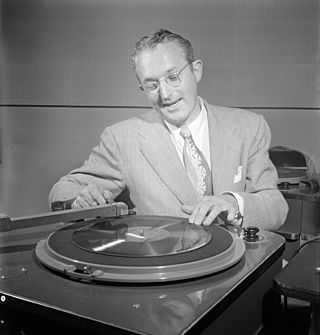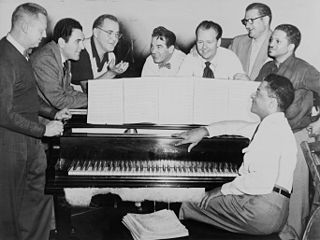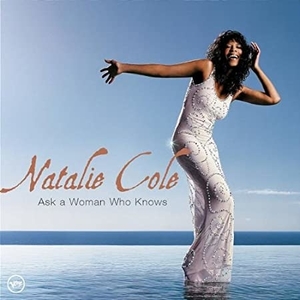Related Research Articles
Swing music is a style of jazz that developed in the United States during the late 1920s and early 1930s. It became nationally popular from the mid-1930s. The name derived from its emphasis on the off-beat, or nominally weaker beat. Swing bands usually featured soloists who would improvise on the melody over the arrangement. The danceable swing style of big bands and bandleaders such as Benny Goodman was the dominant form of American popular music from 1935 to 1946, known as the swing era, when people were dancing the Lindy Hop. The verb "to swing" is also used as a term of praise for playing that has a strong groove or drive. Musicians of the swing era include Duke Ellington, Benny Goodman, Count Basie, Cab Calloway, Jimmy Dorsey, Tommy Dorsey, Woody Herman, Harry James, Lionel Hampton, Glenn Miller, Artie Shaw and Django Reinhardt.

Thomas Francis Dorsey Jr. was an American jazz trombonist, composer, conductor and bandleader of the big band era. He was known as the "Sentimental Gentleman of Swing" because of his smooth-toned trombone playing. His theme song was "I'm Getting Sentimental Over You". His technical skill on the trombone gave him renown among other musicians. He was the younger brother of bandleader Jimmy Dorsey. After Dorsey broke with his brother in the mid-1930s, he led an extremely successful band from the late 1930s into the 1950s. He is best remembered for standards such as "Opus One", "Song of India", "Marie", "On Treasure Island", and his biggest hit single, "I'll Never Smile Again".

James Francis Dorsey was an American jazz clarinetist, saxophonist, composer and big band leader. He recorded and composed the jazz and pop standards "I'm Glad There Is You " and "It's The Dreamer In Me". His other major recordings were "Tailspin", "John Silver", "So Many Times", "Amapola", "Brazil ", "Pennies from Heaven" with Bing Crosby, Louis Armstrong, and Frances Langford, "Grand Central Getaway", and "So Rare". He played clarinet on the seminal jazz standards "Singin' the Blues" in 1927 and the original 1930 recording of "Georgia on My Mind", which were inducted into the Grammy Hall of Fame.

The Pied Pipers is an American popular singing group originally formed in the late 1930s. They had several chart hits through the 1940s, both under their own name and in association with Tommy Dorsey, with Johnny Mercer and with Frank Sinatra.

Melvin James "Sy" Oliver was an American jazz arranger, trumpeter, composer, singer and bandleader.
"Again" is a popular song with music by Lionel Newman and words by Dorcas Cochran. It first appeared in the film Road House (1948), sung by Ida Lupino. An instrumental rendition was used in the movie Pickup on South Street (1953). By 1949, versions by Vic Damone, Doris Day, Tommy Dorsey, Gordon Jenkins, Vera Lynn, Art Mooney, and Mel Tormé all made the Billboard charts.

American vocalist Frank Sinatra recorded 59 studio albums and 297 singles in his solo career, spanning 54 years. Sinatra signed with Columbia Records in 1943; his debut album The Voice of Frank Sinatra was released in 1946. Sinatra would achieve greater success with Capitol and Reprise Records, the former of which he released his final two albums on—Duets and Duets II. Eight compilation albums under Sinatra's name were released in his lifetime, with more albums released following his death in 1998.

"Smoke Gets in Your Eyes" is a show tune written by American composer Jerome Kern and lyricist Otto Harbach for the 1933 musical Roberta. The song was sung in the Broadway show by Tamara Drasin. Its first recorded performance was by Gertrude Niesen, who recorded the song with orchestral direction from Ray Sinatra, Frank Sinatra's second cousin, on October 13, 1933. Niesen's recording of the song was released by Victor, with the B-side, "Jealousy", featuring Isham Jones and his Orchestra.
"The One I Love (Belongs to Somebody Else)" is a popular song composed by Isham Jones with lyrics by Gus Kahn. The song was recorded by Isham Jones' Orchestra on December 21, 1923, at Brunswick Studios in New York City, and published on January 7, 1924. On January 17 in Chicago, Jones recorded another version, with Al Jolson on lead vocals. Both versions made the charts that Spring, with Jolson's peaking at number 2, and Jones' at number 5. Sophie Tucker recorded her version February 1924, released on Okeh 40054.

Harry Aaron Finkelman, known professionally as Ziggy Elman, was an American jazz trumpeter associated with Benny Goodman, though he also led his group Ziggy Elman and His Orchestra.

Ask a Woman Who Knows is a 2002 jazz album by vocalist Natalie Cole, with guest Diana Krall, and receiving four Grammy Award nominations.
Billboard Pop Memories is a series of compilation albums released by Rhino Records in 1994, each featuring ten hit recordings spanning a five- or ten-year period from the 1920s through the 1950s.
For music from an individual year in the 1940s, go to 40 | 41 | 42 | 43 | 44 | 45 | 46 | 47 | 48 | 49
Yes, Indeed! is an album by Tommy Dorsey and his Orchestra, released in 1990 by Bluebird RCA. The album contains recordings of Tommy Dorsey from 1939 to 1945.

"I'm Glad There Is You (In This World of Ordinary People)" is a song written by Jimmy Dorsey and Paul Madeira (sometimes credited as Paul Mertz) first published in 1941. It has become a jazz and pop standard.
Yes Indeed may refer to:

"This Love of Mine" is a popular American song that was first recorded in 1941 by Tommy Dorsey and His orchestra, with a vocal by Frank Sinatra. Sinatra wrote the words and Sol Parker and Hank Sanicola wrote the music.
"In the Blue of Evening" is a song by Al D'Artega and Tom Adair recorded and released in 1943 by Tommy Dorsey and his Orchestra, with Frank Sinatra as the main vocalist. It was subsequently re-recorded by Sinatra, but did not feature on a release until a 1993 reissue of the album I Remember Tommy.

Up Swing is a compilation album of phonograph records released by bandleaders Tommy Dorsey, Glenn Miller, Benny Goodman, and Artie Shaw in 1944 as a part of the Victor Musical Smart Set series. The set, a progenitor to greatest hits releases, features some of the most popular Dance Band Era recordings by the four bandleaders.

Starmaker is a compilation album of phonograph records by Tommy Dorsey, featuring collaborations between Dorsey and artists his band had a role in making popular. These include musicians such as Buddy Rich, composers and arrangers such as Sy Oliver, and vocalists like Frank Sinatra and Jo Stafford. It was released as a part of the Victor Musical Smart Set series.
References
- ↑ Studwell, William Emmett; Baldin, Mark (2000). The Big Band Reader: Songs Favored by Swing Era Orchestras and Other Popular Ensembles. Psychology Press. ISBN 978-0-7890-0914-2.
- ↑ Catalog of Copyright Entries: Third series.
- 1 2 "Record Buying Guide, Part 2". The Billboard. 1941-06-28. p. 101 – via Proquest Entertainment Industry Magazine Archive.
- ↑ "National and Regional Best Selling Retail Records" (PDF). The Billboard. 1941-09-06. p. 10.
- ↑ "Music Popularity Chart". The Billboard. 1941-08-30. p. 16 – via Proquest Entertainment Industry Magazine Archive.
- ↑ "Music Popularity Chart". The Billboard. 1941-08-23. p. 10 – via Proquest Entertainment Industry Magazine Archive.
- ↑ "Music Popularity Chart". The Billboard. 1941-08-09. p. 10 – via Proquest Entertainment Industry Magazine Archive.
- ↑ "Sy Oliver - Yes Indeed". Paste Magazine. 2015-09-14. Retrieved 2020-02-12.
- 1 2 "Coin-Catching Record Possibilities". Variety. 1941-07-04. p. 34 – via Proquest Entertainment Industry Magazine Archive.
- ↑ "Pop Chronicles 1940s Program #3". 1972.
- ↑ Victor 27424
- ↑ "On the Records". The Billboard. 1941-08-30. p. 13 – via Proquest Entertainment Industry Magazine Archive.
- ↑ Bluebird 11248
- ↑ Okeh 6310
- ↑ "On the Records". The Billboard. 1941-08-09. p. 75 – via Proquest Entertainment Industry Magazine Archive.
- ↑ "Record Reviews" (PDF). Cash Box. 1955-04-16. p. 8. Retrieved 2020-02-12.
- ↑ Coral 63190
- ↑ "Pete Fountain" (PDF). New Record Mirror. 1962-03-10.
- ↑ Richmond, Peter (2007-04-17). Fever: The Life and Music of Miss Peggy Lee. Henry Holt and Company. ISBN 978-1-4668-1880-4.
- ↑ "Products Page | Ed Sullivan Show". www.edsullivan.com. Retrieved 2020-02-12.